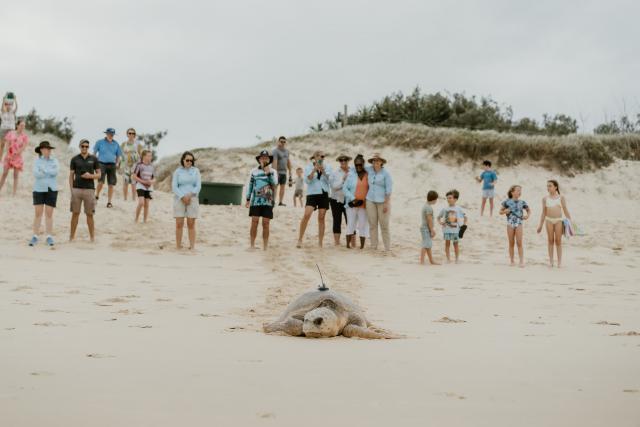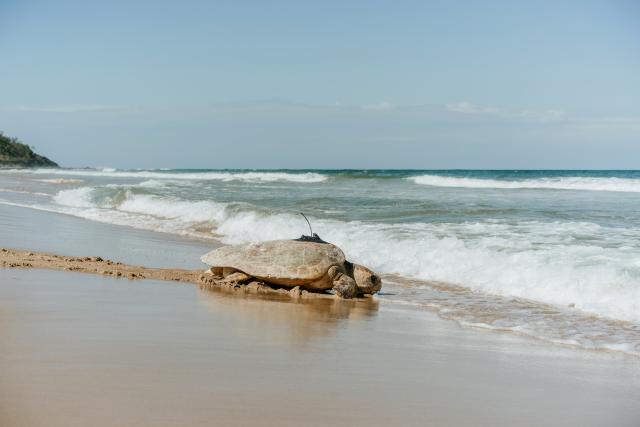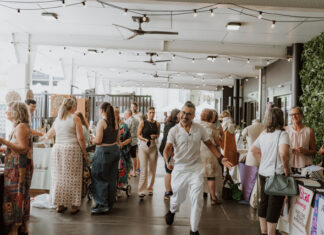Mystery movements of two majestic sea creatures can now be followed in real time.
Trackers installed on two critically endangered loggerhead turtles that nested on Sunshine Coast beaches last December (2022) are active and show they have left our shores to migrate home.
Our turtle friendly community can follow the trail of First Lady and Bullumby via the live map on council’s website by searching ‘tracking turtles’.
Sunshine Coast Council’s TurtleCare Conservation Officer Kate Hofmeister said excitement was high within Sunshine Coast TurtleCare, with volunteers keeping a close eye on the turtles’ migration movements.
“After laying her nest at Buddina, First Lady (identified on the map as 236574) spent her inter-nesting period in the near-shore environment off the east coast of Bribie Island before returning to Buddina to lay her last clutch for the season,” Mrs Hofmeister said.
“She then made her way around Cape Moreton to the southeast coast of Malgumpin (Moreton Island).
“We believe this is her home – First Lady regularly returns to a central location and embarks on what could be foraging trips nearby.
The second turtle to be tracked, Bullumby which means “beautiful one’’, was named by Kabi Kabi Lore/Law Woman and TurtleCare citizen scientist Bridgette Chilli and is identified on the map as 133768.
Mrs Hofmeister said Bullumby appeared to live further afield.
“After laying her final clutch for the season, she followed the coastline north past the top of K’gari (Fraser Island) and has now headed north-east, into the Coral Sea,” Mrs Hofmeister said.
“She could potentially travel up to 2700km back to her feeding grounds and home.
“We are excited to further unlock the mystery of our Sunshine Coast nesting turtles.”
The GPS satellite tags are attached to the back of each turtle and send through highly accurate GPS data on the latitude and longitude location when it surfaces for a breath.
This data is downloaded into the Wildlife Computers Portal and accessed by Queensland Government and Council.
The trackers are expected to work for approximately six months.
Mrs Hofmeister said while it was fascinating to find out where these turtles called ‘home’ at the end of nesting season, the GPS tracking device also told an important story locally as we looked to preserve our Blue Biosphere and help the species recover.
“Our Blue Biosphere is the first 5km offshore,” Mrs Hofmeister said.
“We will use the data to show where they’ve been and use those locations to understand what type of habitat they are using off our coastline between clutches of eggs.
“Since the 1970s, loggerhead turtles nesting along the Queensland coastline have decreased by almost 90 per cent due to a number of threats.
“This makes every nest and every egg critical to the ongoing survival and recovery of this critically endangered population.
“This valuable insight into turtle movements helps us to better understand and protect their habitats – with an ultimate goal to support their populations to recover.”
This exciting project is part of a collaborative research project with Dr Colin Limpus from the Queensland Government’s Department of Environment and Science.
How you can help these precious creatures:
Report turtle tracks, new nests and emerging hatchlings to our Turtle Care hotline or Coolum and North Shore Coast Care.
For sightings on the southern end of the coast call 0437 559 067 and for sightings from Mooloolaba north call Coolum and North Shore Coast Care on 0478 435 377.
Switch off your outside lights from 8pm as light pollution disorientates turtles and hatchlings.
Make sure you take your rubbish with you from the beach so the turtles have a clean environment to lay their eggs in.
Our TurtleCare volunteers are highly trained citizen scientists who are making an incredible contribution to the ongoing survival of critically endangered turtles by monitoring nesting mothers, relocating nests if necessary for hatchling survival, and providing essential data to support the protection of these majestic animal.
All TurtleCare activities are conducted under Queensland Turtle Conservation Project permits.
Find out more about our marine turtles, the TurtleCare volunteer program and the tracking projects on council’s website by searching “TurtleCare” or Google “TurtleCare Sunshine Coast”.









